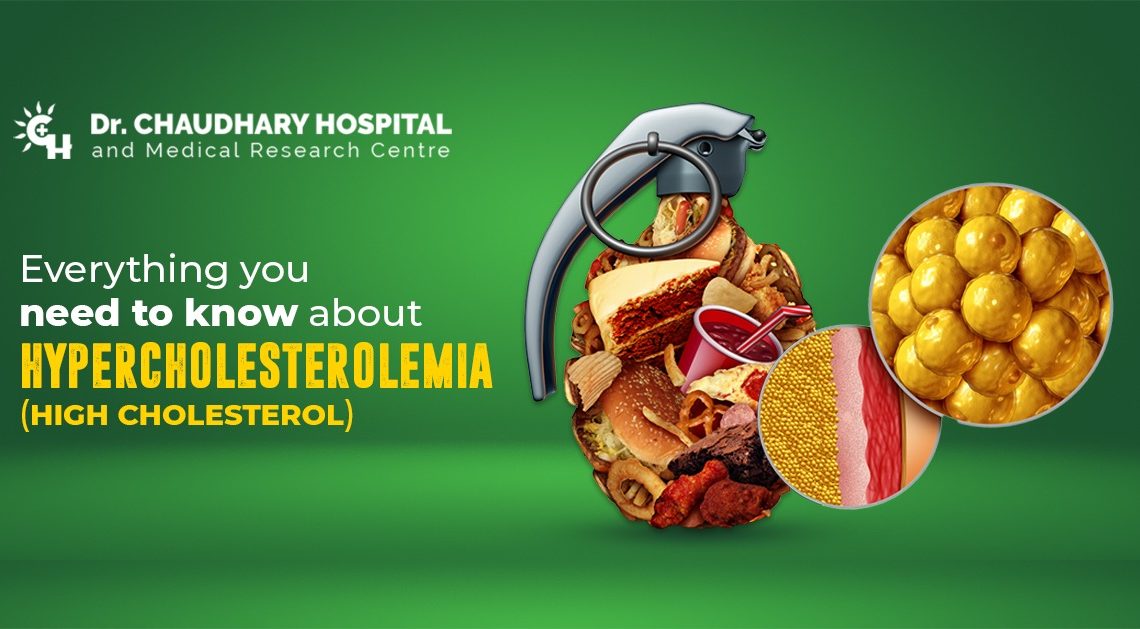Cholesterol is a waxy type of molecule that is present in your blood. Although your body needs cholesterol to create healthy cells, having too much of it can increase your chance of developing heart disease. If you have excessive cholesterol, fatty deposits may develop in your blood vessels. Once this material gets hard or thickens this in turn reduces the flow of blood to your arteries. Sometimes these deposits can suddenly split, forming a clot that causes a heart attack or stroke.
Although high cholesterol (Hypercholesterolemia ) can be passed down through the family, it is typically caused by bad lifestyle decisions, making it both treatable and preventable. In some circumstances, medicine can help lower high cholesterol along with a healthy diet and frequent exercise.
What is hyperlipidemia?
Hyperlipidemia, also known as dyslipidemia or high cholesterol, means the excess of lipids (fats) in your blood. In order to aid in food digestion and the production of hormones, your liver produces cholesterol. However, meals from the meat and dairy sections also contain cholesterol. The cholesterol in meals you eat is excess since your liver can produce all the required cholesterol.
A high cholesterol level is dangerous because it can narrow the arteries that supply blood to various regions of your body. If your arteries do not provide your organs with adequate this in result can damage your body.
Bad cholesterol (LDL), which causes plaque to accumulate inside of your blood vessels and hardened cholesterol deposits, is the most dangerous type of cholesterol. This makes it more difficult for your blood to get through, which increases your chance of having a heart attack or stroke. Depending on the location of the blockage, this may result in a heart attack or stroke.
“Bad cholesterol” refers to low-density lipoprotein (LDL), which normally clogs your arteries and creates a blockage. (High borderline range: 130 to 159 mg/dL. High (range: 160 to 189 mg/dL.)
High-density lipoprotein (HDL) is known as good cholesterol due to the fact that it transports cholesterol to your liver which gets rid of the cholesterol. In this instance, it is facilitating your blood’s passage through your blood vessels. You shouldn’t have an HDL level of fewer than 40 mg/dL.
It’s crucial to understand that healthcare professionals make treatment decisions based on more than just your cholesterol levels.
What are the Symptoms of High Cholesterol (Hypercholesterolemia)?
High cholesterol is typically a “silent” disease. Usually, it doesn’t result in any symptoms. But it might affect your body in the following ways:
- Heart attack
- Stroke
- Coronary heart disease
- Carotid artery disease
- Sudden cardiac arrest
- Peripheral artery disease
- Microvascular disease
Regular cholesterol screening is crucial for this reason. If you are 20 years of age or older, discuss with your doctor whether you should have regular cholesterol screenings and checkups. Find out how this screening may be able to save your life.
How common is hyperlipidemia?
Hyperlipidemia is quite typical. The total cholesterol level in 93 million American individuals (aged 20 and older) is higher than the advised level of 200 mg/dL.
How serious is high cholesterol?
If hyperlipidemia is not treated, it can become quite dangerous. If high cholesterol (Hypercholesterolemia) is left untreated, plaque will continue to build up inside of your blood vessels. Because your blood has a difficult time passing through your blood arteries, this could result in a heart attack or stroke. Your brain and heart are deprived of the oxygen and nutrition they require to function.
Risk factors for high cholesterol (Hypercholesterolemia)
You may be at a higher risk of developing high cholesterol if you:
- Have obesity
- Consume a lot of saturated and trans fats, such as those in fast food, and engage in a little exercise
- Use tobacco products
- It could be heredity in your family
- Have kidney problems, diabetes, or hypothyroidism
- People of all age groups, genders, etc are affected by high cholesterol
How to Control High Cholesterol (Hypercholesterolemia)?
If you have high cholesterol, it is considered better to consult your doctor. He could advise lifestyle changes to help lower it. For instance, they can suggest modifying your daily schedule or routine way of doing things, workout regimen, or diet. They’ll probably tell you to quit smoking if you do.
Your doctor may suggest medications or other therapies to help lower your cholesterol. They could advise you to seek additional treatment from an expert in certain special cases.
How to prevent Cholesterol?
The risk factors associated with cholesterol through heredity are uncontrollable. Lifestyle factors can be controlled, though. Follow this to prevent cholesterol:
- Consume a healthy diet that’s high in fibre and low in animal fats and cholesterol.
- Refrain from using alcohol excessively.
- Sustain a healthy weight.
- Work out frequently.
- Don’t smoke.
For routine cholesterol screening, go by your doctor’s advice. They’ll probably advise you to have your cholesterol levels checked frequently if you’re at risk for high cholesterol or coronary heart disease.
Takeaway
High cholesterol (Hypercholesterolemia) typically has no symptoms. However, untreated high cholesterol might result in major health problems. The good news is that, in many circumstances, your doctor can help you manage this illness and prevent consequences. Follow your doctor’s prescribed treatment schedule and live a healthy lifestyle to reduce your risk of problems from high cholesterol.
To know more about Hypercholesterolemia or get treatment for your high cholesterol visit Dr. Chaudhary Hospital. Dr.Choudhary hospital has the best physicians, doctors, and healthcare facilities; a place where all your health-related issues will be identified, resolved, and overcome.


